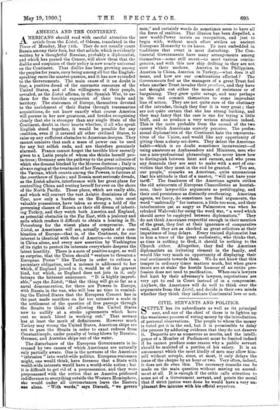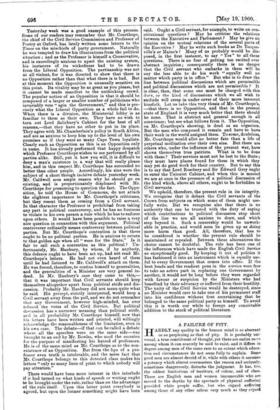CIVIL SERVANTS AND POLITICS.
SUPPLY has its subordinate as well as its principal uses, and one of the chief of these is to lighten up the wearisome process of voting money by the introduction of personal observations. The people to whom the money is voted get it in the end, but it is permissible to delay the process by adducing evidence that they do not deserve it. Demerits are as numerous as merits, and the intelli- gence of a Member of Parliament must be limited indeed if he cannot produce some reason why a public servant should be mulcted of a portion of his salary. It is an amusement which the most kindly of men may allow him- self without scruple, since, at most, it only delays the issue of the cheque by an hour or two. Very often, indeed, it does not do even this. The necessary remarks can be made on the main question without moving an amend- ment at all. It is enough if the critic calls attention to some act of a Government servant, and points the moral that if strict justice were done he would have a very un- pleasant five minutes with his official superiors. Yesterday week was a good example of this process. Some of our readers may remember that Mr. Courthope, the chief of the Civil Service Commission and Professor of Poetry at Oxford, has lately written some letters to the Times on the mischiefs of party government. Naturally he was tempted to draw his illustrations from the political situation ; and as the Professor is himself a Conservative, and is exceedingly anxious to upset the existing system, his instances of its wickedness had to be drawn from the Liberal Opposition. The partisanship was not at all violent, for it was directed to show that there is no Opposition rather than that what there is is bad. But at this moment the Opposition is unusually sensitive on this point. Its vitality may be as great as you please, but it cannot be made manifest to the unthinking crowd. The popular notion of an Opposition is that it should be composed of a larger or smaller number of politicians who invariably vote " agin the Government," and this is pre- cisely what the Liberal Opposition as a whole fail to do. When there is a division, the Ministerial lobby is as familiar to them as their own. They have no wish to turn out Lord Salisbury's Cabinet for the best of all reasons,—that they have no other to put in its place. They agree with Mr. Chamberlain's policy in South Africa, and are as anxious to keep him up to the level of his own promises as if they were so many Cape Town loyalists. Clearly such an Opposition as this is an Opposition only in name. It has already performed that happy despatch which Professor Courthope wishes to see performed by all parties alike. Still, put it how you will, it is difficult to deny a man's existence in a way that will really please him,and in this respect Mr. Courthope has succeeded no better than other people. Accordingly, his sins were the subject of a short though incisive debate yesterday week. Mr.. Caldwell sees ample reason why he should go on existing, and is proportionately displeased with Mr. Courthope for presuming to question the fact. The Oppo- sition, he told the House of Commons, do not attach the slightest importance to Mr. Courthope's criticisms, but they resent them as coming from a Civil servant. In that character the Professor is prohibited from taking any part in political controversy, and he has no business to violate in his own person a rule which he has to enforce upon others. It would have been possible to raise a very nice question in connection with this argument. Political controversy ordinarily means controversy between political parties. But Mr. Courthope's contention is that there ought to be no political parties. He is anxious to return to that golden age when all "were for the State." Is it fair to call such a contention as this political ? Un- fortunately, Mr. Hanbury, by whom, if by anybody, this defence ought to have been set up, had not read Mr. Courthope's letters. He had not even heard of them until he had listened to Mr. Caldwell's attack on them. He was forced, therefore, to confine himself to generalities, and the generalities of a Minister are very general in- deed. In Mr. Hanbury's case they came to this,— that it was important that Civil servants should keep themselves altogether apart from political strife and dis- cussion. Probably Mr. Hanbury did not mean quite what he said. His precept, strictly interpreted, would keep a Civil servant away from the poll, and we do not remember that any Government, however high-minded, has ever refused the votes of the Civil Service. But political d,:scussion has a narrower meaning than political strife, laid in all probability Mr. Courthope himself, now that his letters have been written and printed, will willingly ack-oowlecige the reasonableness of the limitation, even in his own ease. The debate—if that can be called a debate where all the speeches were on the same side—was brought to an end by Mr. Bowles, who used the occasion for the purpose of manifesting his hatred of professors. Ile is of the same mind as Mr. Courthope as to the non- existence of an Opposition. But from the lips of a pro- fessor even truth is intolerable, and the mere fact that Mr. Courthope belongs to this detested class makes his letters "only so many lines of print to which nobody will pay attention."
There would have been more interest in this interlude if it had turned on what kinds of speech or writing ought to be brought under the rule, rather than on the advantage of the rule itself. Upon this latter point everybody is agreed, but upon the former something might have been said. Ought a Civil servant, for example, to write on con- stitutional questions ? May he criticise the relations between the Executive and Parliament ? May he give in opinion on the mutual relations of the several parts of the Executive ? May he write such books as De Tocque- ville's or Maine's ? Many of us probably would be dis- posed, in the first instance, to say " Yes " to all these questions. There is no fear of getting too excited over abstract inquiries ; consequently there is no danger that the Civil servant who embarks in them will be any the less able to do his work "equally well no matter which party is in office." But who is to draw the line between political discussions which are permissible and political discussions which are not permissible ? It is clear, then, that some one must be charged with this duty, or the kind of discussions which we all wish to exclude will creep in under cover of their more innocent kinsfolk. Let us take this very thesis of Mr. Courthope's, —that there is no Opposition, and that in the present state of England it is very much better that there should be none. That is abstract and general enough in all conscience; but see what follows from it. The Opposition, on Mr. Courthope's showing, is dead as an organism. But the men who composed it remain and have to have their work in the world assigned them. To some, doubtless, Mr. Courthope would allot no better fate than a life of perpetual meditation over their own sins. But there are others who, under the influence of the present war, have shown themselves true patriots. What is to be done with these? Their services must not be lost to the State ; they must have places found for them in which they may yet do good work for their country. But to say this is to say that Lord Rosebery and Sir Edward Grey ought to enter the Unionist Cabinet, and when this is mooted we are at once in the presence of a political discussion of the kind which, above all others, ought to be forbidden to Civil servants.
We uphold, therefore, the present rule in its integrity. We recognise that it debars the Civil servants of the Crown from subjects on which some of them might use- fully write. But we recognise also that there is no authority that can be trusted with the duty of saying which contributions to political discussion stop short of the line we are all anxious to draw, and which step beyond it. Such a censorship would be unwork- able in practice, and would soon be given up as doing more harm than good. All, therefore, that has to be considered is whether the present rule should be maintained or repealed. Between these alternatives the choice cannot be doubtful. The rule has been one of the influences which have made the English Civil Service so exceptionally good. By keeping it out of politics it has fashioned it into an instrument which is equally use- ful to every Government that comes into office. If the best heads and the readiest pens in the service were free to take an active part in replacing one Government by another, it would not be long before they were regarded with favour or suspicion by the Ministers who had benefited by their advocacy or suffered from their hostility. The unity of the Civil Service would be destroyed, since no Minister would care to take one of his permanent staff into his confidence without first ascertaining that he belonged to the same political party as himself. To avoid this it is worth our while to forego any conceivable addition to the stock of political literature.







































 Previous page
Previous page